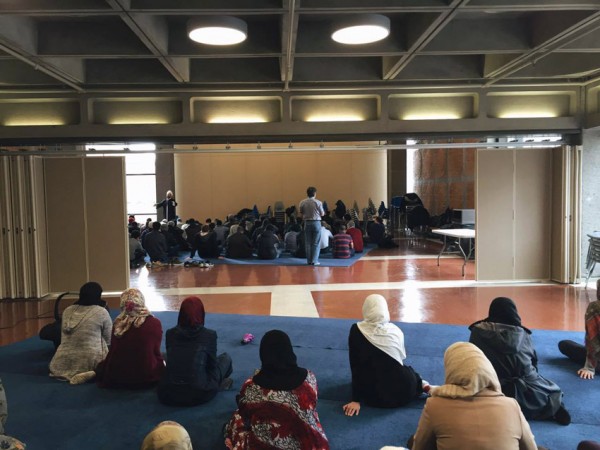In 2005, McGill decided that due to space shortages it needed to evict the Muslim Students Association (MSA) and the Sexual Assault Centre of the McGill Students’ Society (SACOMSS) from their previous space. SACOMSS found a new home, but the MSA students were left without a space for daily prayers and ablution. They were forced to protest for a new home, conducted mass prayers on the field outside of the McLennan Library, and even went so far as to take the university to the Quebec Human Rights Commission. In the interim, the Students’ Society of McGill University (SSMU) Building provided the hundreds of Muslim students making five daily prayers with a small room in the basement as a ‘temporary solution.’ Ultimately, the MSA lost both the case and it’s space. Flash forward more than 10 years later, and unfortunately nothing has changed.
Vice President Communications for MSA and third-year Economics and Accounting student, Zain Syed, points to the bureaucratic deadlock that has arisen not only with MSA, but also with student groups such at Divest McGill and Midnight Kitchen.
“It’s important to put it out there that the administration has a lag when it deals with the student groups,” Syed said. “[Whereas] we change council members every year, the administration is [less transient].”
In February of last year, the plight of McGill’s MSA garnered national attention with an article in Maclean’s. Over a year later and the MSA has had no further developments with prayer spaces on campus. Every day, over 100 Muslim students continue to make use of the small room in the SSMU basement beside Gerts. Though most students making daily prayers will mention how thankful they are for the room in SSMU, the space is clearly lacking. The room itself fits 20 people at best, and loud music streams in from nearby rooms.
Saima Uddin, a History and Islamic Studies major who usually prays three times a day on campus, says that although she is grateful for the space, the SSMU room is not ideal.
“Every day around four when people finish class, there are long wait times to pray—around 10 to 15 minutes,” Uddin said. “Sometimes it’s a little loud, but we have to accommodate because the fact that we have a room is good.”
While there is a common misconception that the lack of prayer space at McGill is simply a problem for Muslim students, Syed draws attention to the fact that McGill’s refusal to accommodate their Muslim student population stems from a general inability to create spaces that promote faith, engagement, and mental health on campus.
“Prayer for Muslim students is not only something that is mandated that they have to do five times a day, but a practice of mental health,” Syed said. “Most students use prayer as an opportunity to meditate and reflect, and take a break. McGill is an incredibly high-stress environment and these spaces simply do not exist on campus.”
Sara Parks, the director of the McGill Office of Religious and Spiritual Life, notes that there is a scientific correlation between the positive effects of mindfulness, prayer, religious community, meditation, and relaxation on student mental health. She says that encouraging religious diversity on campus is essential to the prosperity of the University.
“The more diverse voices, the healthier and more relevant the the academic community,” Parks stated. “Not providing a campus where students who identify as religious can flourish and belong is an equity issue, and a serious one. I believe that any R1 institution worth its salt should actively participate in the celebration and encouragement of a diverse student body.”
Syed is optimistic that the university will start to tackle this equity issue, and soon. He notes that recently an interfaith collective of many student groups, including the McGill Interfaith Student Council and the MSA assembled a proposal to the Library Improvement Fund for the inclusion of a prayer/meditation space in the new designs for McLennan library. In the research for this proposal the Syed and members of the proposal assembled a full page list of North American universities that have prayer spaces in their libraries while operating as secular institutions.
“UofT is a secular institution, Western is a secular institution,” Syed said. “These universities have huge multi-faith prayer spaces [….] In fact, I’ve been to the UofT multi-faith building—yes they have an entire three-floor building. At the end of the day these are supposed to be the safe spaces universities need.”
In an effort to create similar multi-faith spaces at McGill, the McGill Office of Rligious and Spiritual Life (MORSL) has endorsed numerous student proposals for prayer and meditation space, not only for Muslim students, but for all students. Aside from the increased cultural diversity and health benefits, Parks stresses that these multi-faith spaces are of the utmost importance in our current political environment.
“It’s my dearest hope in this time of rising religious extremism, Islamophobia (at times right here on campus), and oversimplified media caricatures of the depth and richness of human religious experience, that religious literacy and a real flourishing of pluralism will prevail at McGill,” Parks stated. “On a campus like McGill, which is touted as ‘world-class’ and which has such a strong international contingent, prayer space is simply non-optional.”
Somehow McGill’s brand of secularisation has become akin to a marginalization which leaves Muslim students waiting 15 minutes for space in a crowded room in SSMU basement, a corner of McLennan library, or under stairwells. The basement room which was once suggested as a short-term solution, has spanned over 10 years with little prospect of accommodation on McGill’s part. The MSA and MORSL are optimistic that the McGill administration will start working to improve the multi-faith services on campus, however it is evident that change is slow coming. That there has yet to resolve the events in 2005 which left the MSA displaced is a testament to the work ahead.









